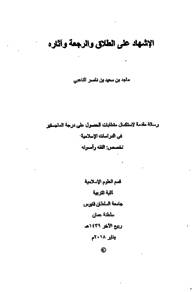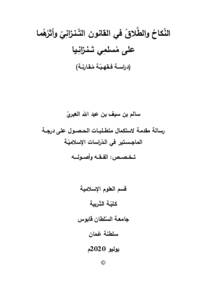Document
الإشهاد على الطلاق و الرجعة و آثاره
Publisher
جامعة السلطان قابوس
Gregorian
2018
Language
Arabic
Subject
English abstract
This study aims to elucidate the juristic judgment on continuation of the bond of marriage after divorce between a couple of different views concerning the judgment on bringing witnesses to divorce and remarriage has happened, and recognize the sharia and social sequences resulted from this jurisprudence (figh) variety. Pursuing this objective, the research planhas included an introduction, two chapters and an epilog. The introduction approached the juristic judgments on bringing witnesses (Ish-had) to marriage contractand the agreed and non-agreed conditions regarding the witness. I explained the different opinions of the jurists (fuqaha) on bringing witnesses to marriage contract; supported with their arguments and mentioned the preponderant ones. Furthermore, I reviewed the significance of bringing witnesses to marriage contract and its implications. Following that, I viewed the jurists' opinions on the judgment of bringing witnesses to divorce contract, which are: ish-had is recommended (mustahab) and obligatory (wajib); it isa condition for the validity (sihat) of divorce. After further discussing the opinions of the juristic schools, it has come to be appear that the preponderant opinion is that ish-had is an obligatory; and that marrying one who doesn't approve divorce without ish-had to another one who finds that bringing witness is not a condition of divorce validity is not legally had -effective. I approached the written divorce and divorce by sign, and to what extent ish can be actualized; explaining the jurists' opinions and differences regarding that and highlighting the preponderant rules. The study examined the method of ish-had actualization through the contemporary means of communication, by comparing them to the traditional ones approached by the jurists in their books, in the past and recently. I explained the legal (sharia) sequences resulted from the two opinions of having and not having ish-had as a condition for divorce contract validity; in terms of the continuation or termination of the bond of marriage, the matrimonial relationship, the verification of lineage and the wife's marriage from another man. After that, I approached the social effects resulting from having or not having ish-had to divorce contract as a condition: such as hastening in divorce, marriage life stability, frequent divorce and how it reduce it, family disintegration and the discord between the couple families. Concerning bringing witnesses to remarriage, this study showed disagree among the jurists on its rules; some of them view ish-had as a recommended condition while some others think it is an obligatory. There is a third fiction says that it is an obligatory condition for the validity of remarriage. The study, also, discussed, in details, the proofs and arguments of each opinion and explained the sharia rule concerning remarriage under the impossibility of bringing witnesses to and the rule regarding divorce after remarriage; to conclude that it is not prohibited to have a person who doesn't approve ish-had as a condition for remarriage validity get married to another one who looks to ish-had as a condition for remarriage validity. I presented the sharia sequences resulted from having or not having ish-had as a condition for remarriage; such as the continuation or termination of waiting period, marriage relationship and the verification of lineage of children. The study concluded that discussion explaining the sharia rule on the continuation of the bond of marriage in case of disregarding ish-had to remarriage from the perspective of those who said that ish-had is a condition and disregarding it is excusable if the concerned person is not aware of it. Furthermore, I approached the social effects resulting from having or not having ish-had to remarriage as a condition: such as approving or denying remarriage by the couple and the effects of interference practiced by the couple families; with mentioning the side effects on the children. I have concluded this research presenting the most significant findings and recommendations. May Allah Al-Mighty bless us with all straightforwardness in saying and working.
Description
رسالة جامعية
Member of
Resource URL
Arabic abstract
تهدف هذه الدراسة إلى بيان حكم بقاء العصمة الزوجية بعد حصول طلاق بين زوجين مختلفين في حكم الإشهاد على الطلاق أو الرجعة، وإدراك الآثار الشرعية والاجتماعية الناجمة من ذلك الاختلاف الفقهي. وسعيا لتحقيق هذا الهدف جاءت خطة البحث مشتملة على مدخل تمهيدي وفصلين وخاتمة. بينت في المدخل حكم الإشهاد على عقد النكاح، وشروط الشاهد عليه: المتفق عليها والمختلف فيها، وعرضت أقوال الفقهاء في حكم الشهادة على عقد النكاح مع أدلتهم وذكر الراجح منها، مع بيان أهمية الإشهاد والأثر المترتب عليه في عقد النكاح. ثم عرضت أقوال الفقهاء في حكم الإشهاد على عقد الطلاق، وهي: استحباب الإشهاد ووجوبه، وأنه شرط صحة لوقوعه، ثم بسطت أدلة المذاهب مع مناقشتها، وتبين لي أن القول الراجح هو الوجوب. وأن تزويج من يدين بعدم وقوع الطلاق من غير إشهاد عليه ممن لا پرونه شرطا لصحة وقوع الطلاق لا يصح. ثم تكلمت عن الطلاق بالكتابة والإشارة ومدی تحقق الإشهاد فيهما موضحا أقوال الفقهاء واختلافهم مع بيان الراجح منها. وتعرضت الدارسة الكيفية تحقق الإشهاد في وسائل التواصل المعاصرة، مع المقارنة بينها وبين الوسائل المعتادة التي ذكرها الفقهاء في كتبهم قديما وحديثا. ثم بينت الآثار الشرعية المترتبة على القول باشتراط الإشهاد على عقد الطلاق والقول بعدم اشتراطه: من بقاء العصمة الزوجية أو انتهائها، والمباشرة الزوجية وثبوت نسب الأبناء، وانتقال الزوجة لعصمة زوج آخر، ثم شرعت في ذكر الآثار الاجتماعية المترتبة على القول باشتراط الإشهاد على عقد الطلاق والقول بعدم اشتراطه: كالاستعجال في الطلاق واستقرار الحياة الزوجية، وكثرة وقوع الطلاق والحد منها، والتفكك الأسري وتنافر أسر الزوجين. وأما الإشهاد على الرجعة فبينت هذه الدراسة خلاف العلماء في حكمه، بين قائل باستحبابه وقائل بوجوبه، وقائل بوجوبه وأنه شرط صحة، مع مناقشة مستفيضة لأدلة كل مذهب؛ وبينت حكم الرجعة مع تعذر الإشهاد، وحكم الطلاق بعد المراجعة. ثم خلصت إلى أنه لا يمتنع تزويج من يرى أن الإشهاد ليس بشرط لصحة الرجعة ممن يرى أن الإشهاد شرط لها. ثم سقت الآثار الشرعية المترتبة على اشتراط الإشهاد في الرجعة وعدم اشتراطه: كبقاء عدة الطلاق أو انتهائها، و حكم المباشرة الزوجية ومدى ثبوت نسب الأبناء. وختمت ذلك ببيان حكم بقاء العصمة الزوجية عند القائلين باشتراط الإشهاد إن ترك الإشهاد على المراجعة، وأنه يعذر في حال الجهل أو في حال كونه متأولا. ثم بينت الآثار الاجتماعية المترتبة على اشتراط الإشهاد في الرجعة وعدم اشتراطه، كإثبات المراجعة أو إنكارها من قبل الزوجين، وما يحصل من تدخل أسر الزوجين ووقوع التخاصم، مع ذكر الآثار الجانبية على الأبناء ثم ختمت البحث بذكر أهم النتائج التي توصلت إليها، وأهم التوصيات التي خرجت بها. والله سبحانه أسأله التوفيق والسداد لما يحبه ويرضاه.
Category
Theses and Dissertations


